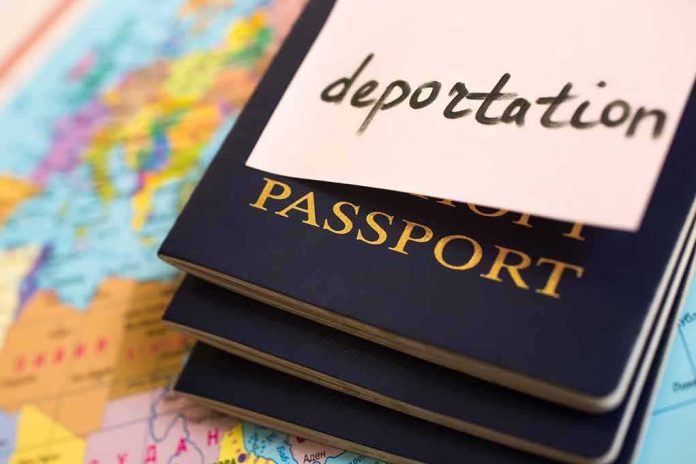
A new US policy sends 250 migrants to Rwanda, raising questions about ethical and legal implications.
Story Overview
- The U.S. has signed an agreement with Rwanda to deport up to 250 migrants whose home countries refuse their return.
- This controversial move follows similar but cancelled agreements Rwanda had with the UK.
- The deal’s legality and Rwanda’s human rights record spark heated debate.
- Trump’s administration seeks to enforce stricter immigration policies through such international agreements.
U.S. and Rwanda Agreement on Migrants
In June 2025, the U.S. finalized a landmark agreement with Rwanda to deport up to 250 migrants. These individuals are from countries that have refused to accept their repatriation. This arrangement is part of a broader U.S. strategy to manage irregular migration by redirecting certain non-citizens to third countries willing to accept them. This is the first such agreement between the U.S. and Rwanda, marking a significant shift in immigration enforcement under the Trump administration.
The agreement with Rwanda is not without its controversies. Rwanda previously negotiated a similar deal with the UK in 2022, which was later scrapped after a change in the UK government and a Supreme Court ruling that declared Rwanda was not a safe third country. Critics have raised concerns about Rwanda’s human rights record and the ethics of third-country deportations. However, the U.S. government emphasizes its commitment to enforcing immigration laws and reducing the number of migrants who cannot be repatriated to their home countries.
Rwanda’s Role and Motivations
Rwanda’s acceptance of up to 250 migrants is part of a broader effort by the country to position itself as a partner for Western nations looking to relocate asylum seekers. The Rwandan government, motivated by a history of displacement and a commitment to reintegration, sees potential diplomatic and financial incentives in this agreement. A Rwandan government spokesperson stated that the decision aligns with the country’s values of reintegration and rehabilitation, given nearly every Rwandan family has experienced the hardships of displacement.
Despite these assurances, Rwanda’s capacity to integrate deportees is under scrutiny. Concerns about the country’s resources and the social impact of integrating non-Rwandan migrants persist. These issues highlight the potential strain on Rwanda’s social fabric, should the number of deportees increase or integration challenges arise. Nevertheless, the U.S. holds significant diplomatic and financial leverage in this agreement, which could include financial support for resettlement costs.
Legal and Ethical Considerations
The agreement has sparked a debate over its legality and ethical implications. Legal scholars have pointed out that similar deals have faced challenges, as demonstrated by the UK Supreme Court’s decision regarding Rwanda’s safety as a third country. Human rights organizations have expressed concerns about the safety and rights of deported migrants, emphasizing Rwanda’s human rights record. While some argue that such agreements are pragmatic solutions for managing irregular migration, others view them as violations of international refugee protections.
U.S🇺🇸 and Rwanda🇷🇼 have agreed for the African country to accept up to 250 migrants deported from the United States, President Paul Kagame's government says, stating that the migrants will be provided with "workforce training, healthcare, and accommodation support to jumpstart… pic.twitter.com/iDYrdnPnZf
— Kennedy Wandera (@KennedyWandera_) August 5, 2025
As the U.S. continues to pursue third-country deportation agreements, this deal with Rwanda may set a precedent for future arrangements. The Trump administration’s efforts to enforce stricter deportation policies are likely to influence global migration management practices. However, the debate over the ethics and legality of such agreements remains unresolved, with potential diplomatic tensions and legal challenges looming on the horizon.
Sources:
US Finalizes Deal to Send 250 Migrants to Rwanda Under Third-Country Deportation Pact
Trump Admin Strikes New Deportation Deal with Rwanda to Get Illegal Aliens Off American Soil
Rwanda Says It Will Accept Up to 250 Migrants from the US
Rwanda Accepts 250 Deportees Under US Trump’s Third-Country Plan










